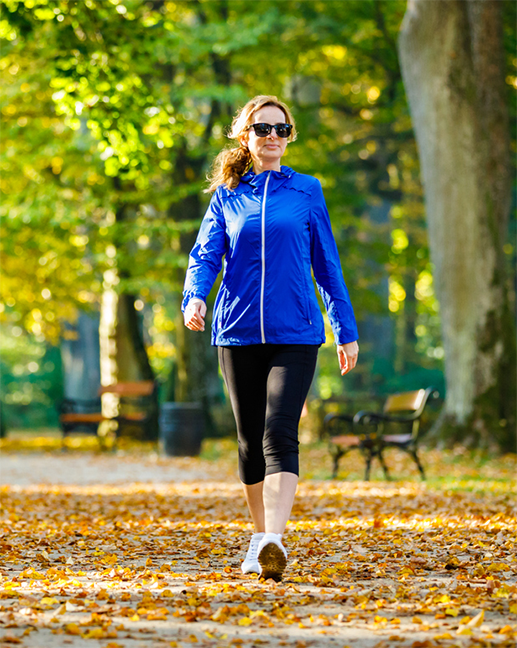KINGSTON, R.I. – September 15, 2022 – With summer winding down and the return to a more structured schedule, September is an ideal time to consider starting or restarting a regular walking program.
The health benefits of walking are many, notes Gary Liguori, dean of the College of Health Sciences at the University of Rhode Island. Regular brisk walking can help you maintain a healthy weight, lose body fat, prevent or manage various health conditions (i.e., heart disease, stroke, high blood pressure), strengthen bones and muscles, increase energy levels, improve mood and memory, and reduce stress.
“It’s also very low impact on the joints, including ankles, knees, hips and lower back,” says Liguori. “If you walk with a friend, it can also be great for social interaction.”
The keys to maximizing the many benefits of walking is to be prepared and to set simple goals. The advice of Liguori is to Keep It Simple to Succeed, often called “KISS.” He recommends the following tips to begin a walking regime:
Set aside several time slots each week for walking, deciding on what time of day and the days you will walk, and adding them to your calendar.
Set a reminder on your phone for a few hours ahead of time to help you stay on track. Let others in your household know that you are setting aside personal health time and ask them to help you stick to your plans by respecting your walking time.
Choose your route in advance (unless you are using a treadmill) based on the time you designate for walking.
Plan on starting your new routine with a short to moderate distance that you can increase over time. Twenty minutes of walking per session is a great place to start. Build up to a weekly goal, such as 75 minutes each week, then 100, and so on. Most health organizations recommend 150 minutes per week of moderate exercise but increments of as little as 10 minutes spread throughout the day will provide benefits, especially if you are not currently active.
Choose and lay out the clothing and shoes you’ll be wearing in advance.
Keeping your gear in sight is a strong prompt to use it! Invest in a comfortable pair of shoes; no need to break the bank. Wear layers when the temps start to dip; and, if you walk at dawn or dusk, reflective clothing (and perhaps a head lamp) is a must. Don’t forget a watch or phone to track your time and consider one of any number of walking apps to track your speed and distance.
Walk at a comfortable pace.
If you can sing a song out loud with no problem while walking, you may need to speed up a bit. If you have trouble talking or catching your breath, you may be walking too fast.
Be aware of your surroundings.
If you are walking on a road, stay safely on the sidewalk or the correct side of the road. No matter where you walk, take your earbuds if you’d like, but keep the volume low so you can easily hear oncoming traffic and passersby. If you plan to walk in the evening, choose a well-lit area.
Track your progress.
Log your walking times and distances, and over time, gradually increase to a reasonable goal. Seeing your progress recorded can really be a motivator for continued good habits.
Most of all, says Liguori, have fun. Take in the sights and sounds around you, breathe in some fresh air, and prepare to enjoy all the positive benefits of a regular walking routine.
Note: Almost everyone can easily begin a walking regime, but if you are experiencing any acute health issues, it’s always wise to check with your health-care provider first.
Gary Liguori, Ph.D., is dean of the University of Rhode Island’s College of Health Sciences. He serves as editor-in-chief of the American College of Sports Medicine (ACSM) Exercise, Sport, and Movement journal, and as senior editor of the ACSM’s Guidelines for Exercise Testing and Prescription, an industry handbook that sets scientifically based standards on exercise testing and prescription in healthy and diseased patients.

